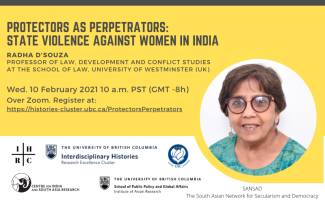Protectors as Perpetrators: State Violence Against Women in India
February 10, 2021, 10:00 am to 10:00 am
UBC
Professor Radha D’Souza’s address focuses on state violence against women in India. India is widely perceived to be the most populous democracy in the world. Its progressive constitution puts classical liberal rights including equality, non-discrimination, right to life and access to justice at the heart of the constitution as fundamental rights. At the same time India is also seen as the most dangerous country to be a woman in. Within and outside academia, the endemic and routinised violence against women is widely attributed to familial and societal causes. If the law fails to bring perpetrators of violence against women to justice, corruption within police and dysfunctional criminal justice system is seen as the problem. Going beyond these frames of analysis, Professor D’Souza examines statutes like the Armed Forces Special Powers Act that exempt army personnel form prosecution in occupied territories, state organised pogroms against religious and caste groups, and the endemic everyday police violence against poor, Dalit (marginalised castes) and Adivasi (indigenous) women. Her address calls into question the assumptions about normative and procedural standards, including human rights standards, in Legal Studies and the theoretical and methodological strategies in Gender Studies that are typically used to analyse violence against women in India. State violence against women unravels assumptions about gender-based violence and rights based legal remedies.
This event is organized by Dr. Sunera Thobani (UBC) and Interdisciplinary Histories Research Cluster. It is co-sponsored by the Centre for India and South Asia Research/Institute for Asian Research/School of Public Policy and Global Affairs and Department of Asian Studies at UBC, and the South Asian Network for Secularism and Democracy.
This event has already taken place and Registration is now closed.

